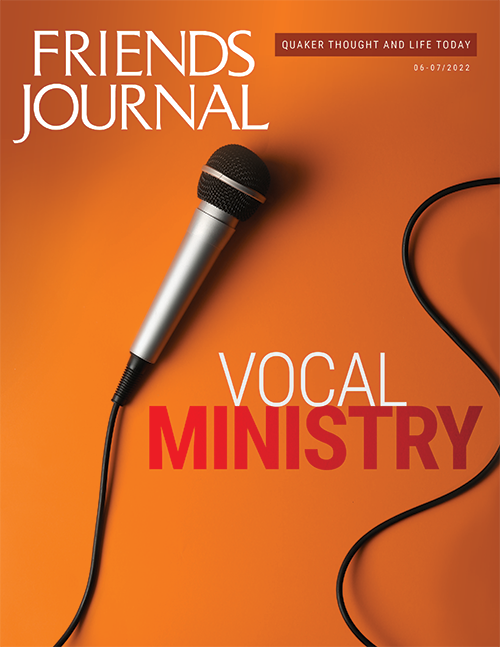Receiving and Delivering Messages during Worship
“Where is the dance floor going to be?” I asked the other women in the group as I set up two chairs. We were arranging seating for a Black lesbian band concert. One of the women paused and asked, “Why do we need a dance floor?”
What an odd response, I thought. “To dance, of course,” I replied. More women stopped and looked at me. They were puzzled. Why would the crowd need a dance floor to dance?
Then it dawned on me. I was the only White woman in the group. I laughed and said, “You know we White women need permission to dance. We have to have a designated area because we don’t dance in the aisles.” There was laughter, and someone said, “O-o-oh. That’s why. I’ve always wondered about that.”
Social constraints of displays of emotions are part and parcel of silent worship for a lot of North American Friends because most of us are Northern European descendants. We need permission to dance in the aisles.
Since the beginning of the Religious Society of Friends, written advices have guided Friends. Yearly meetings’ faith and practice books, Pendle Hill pamphlets on vocal ministry, and individual monthly meetings’ “Welcome to Quaker Worship” handouts have guidelines for speaking or not speaking in meeting for worship. In 2019, Friends General Conference even published a poster of a circle flow chart with guidelines for delivering a message during worship (Stan Thornburg’s article in the July/August 1997 issue of Quaker Life inspired the poster).
One frequently mentioned guideline about vocal ministry is to “come to meeting with neither an intention to speak, nor a determination not to speak.” When I was new to unprogrammed worship, I participated in Quaker 101 discussions, which included vocal ministry advices. From these discussions, I learned that centering in worship in meeting is necessary to create the corporate body of Friends. It is the centering that creates a pathway, an opening, for Spirit to speak: to deliver a message through a Friend. For me, receiving a message rarely happens without the corporate body of Friends.
It is the centering that creates a pathway, an opening, for Spirit to speak: to deliver a message through a Friend. For me, receiving a message rarely happens without the corporate body of Friends.
However, one time I received a message when I was alone. It happened in 1995 after a friend killed herself. Her name was Terri Jewell. She was a Black lesbian poet and writer who received a New York Library Reading Award in 1994 for the anthology The Black Woman’s Gumbo Ya-Ya.
I received an inspired message in the week that followed her death. It wasn’t as complete as it usually is when I am in meeting for worship. It came slowly over several days and nights, a sure message that created a freeform poem. The poem extolled the glory of blackness, of darkness in the night, in the down deep of the soul, in the shadings that form visual dimensions, and in the shadows that provide relief from the heat and glare of midday.
From that message, I received a concern about how the words darkness and black convey negative images in our Western culture. I also discovered the way Friends use the word light can reinforce those negative images. Since writing the poem, I have gotten messages in other meetings for worship that speak of the restfulness of night, of seeking the center of the deep, dark, Inside Presence in each of us that comforts and consoles us.
Now I try to use other words in place of “black” and “dark” in my language. Instead of using the word “blackmail” I use extortion. Instead of saying “black comedy,” I say gallows comedy, suffering comedy, or tragic comedy. Instead of writing of “dark days,” I write of despairing, depressing days. Instead of asking the meeting to “hold me in the Light,” I ask, “Hold me in healing and wholeness.”
It is questionable to use the word Light as the essence of all healing, and there is a group of people who are not included when Friends use the word. Rhiannon Grant, in her January 2022 Friends Journal article, indicated: “The image of the ‘Inward Light’ also draws on the experience of sighted people.” Someone born blind or who became blind in early childhood has no image of light.
A poem I’d composed and the steady assurance that this message needed to be delivered during corporate worship caused me to come to meeting with a determination to speak. This was a first for me and added to my knowledge of how messages can be conveyed to me. Faith and Practice advices helped me understand my physical reactions to receiving a message in worship: an increase in heart rate, a breathlessness, a groping for words, and a fear I wouldn’t get it right. All these were telling me: “Pay attention. I have something for you to deliver.”
With the experience of having received and delivered messages, I gained faith in my ability to recognize them when they come to me.
As I gained experience with physical reactions accompanying receiving a message, I found I could bargain with the Giver. There have been times when I have said silently, trying to ignore my rapid breath and heartbeat, “I’m not standing until You give me the words to start and a clearer understanding of the message.” And sometimes I’ve been blessed to sense a smile in return.
There are times when delivering a message is strenuous, fatiguing, or exhilarating. I feel foolish, exhausted, and hungry for more. It is an interface with the Divine I sorely miss.
With the experience of having received and delivered messages, I gained faith in my ability to recognize them when they come to me. Not all of them are heart-pounding. Some messages are a simple repetition of a phrase that keeps nudging me until I stand and speak. Many messages I deliver are sparks from ministries already delivered in worship, which in turn enhance those messages.
At present, I am a member of Floyd (Va.) Meeting. Our meeting is a quiet one. Worship in centering silence without messages is the norm. Some of us desired more vocal ministry and asked our meeting for an education session to discuss ways to encourage messages. During that discussion, a Friend asked: “Is Spirit going to speak to us only from 10:00 to 11:00 a.m. on First Day? If every day, every hour is sacred, then are we not to speak of those times when Spirit spoke [to us]?”
This Friend questioned some of the vocal ministry constraints that have developed throughout Friends history. She wanted us to decide for ourselves if we would always stay within such silent meeting limitations.
In some meetings I attended, there is a period at the end of worship before the rise of meeting when the clerk asks for any “thoughts that did not rise to the level of a message.” Some people do not like this procedure. To them, it implies Friends are not in worship during meeting. It suggests Friends are thinking their own thoughts when they should be listening, waiting expectantly for Spirit’s presence.
However, I frequently feel the thoughts expressed in response to the invitation are seeds of messages that did not blossom because the speaker is not confident enough to stand and deliver. It is a daunting task to be vulnerable and unsure of which words to use to deliver the message. I was one of the unsure people in my early experiences of accepting a message. I felt foolish and uneasy as to what to say. A verse in the First Epistle to the Corinthians (4:10) reads, “We are fools for Christ’s sake.” This verse helped me to be a fool for Christ and gave me the courage to stand and speak.
After one meeting in which I had delivered a message, an older Friend said to me, “Thank you for being faithful to the message.” I said I had never heard the phrase. She told me in earlier days Friends would ask each other, “Was thee faithful? Did thee yield?” when asking after their spiritual condition.

Before the COVID pandemic, Floyd Friends had four to fifteen attenders. Now we have four to six attenders on Zoom. We are not a physical corporate body. Any messages I receive now are only for me.
A Friend once told me, “I believe there is a critical mass necessary for a meeting to be gathered.” Robert Barclay, in his 1678 An Apology for the True Christian Divinity, addressed the first part of the critical mass concept—the number of people present—with an example of candles:
And as many candles lighted, and put in one place, do greatly augment the light and make it more to shine forth; so when many are gathered together in the same life, there is more of the glory of God, and his power appears, to the refreshment of each individual, for that he partakes not only of the light and life raised in himself, but in all the rest.
The second part of the critical mass concept is having people present in meeting who are receptive to delivering a message, which London Yearly Meeting’s Revision Committee addressed in 1911:
The meeting affects the ministry quite as truly as the ministry affects the meeting. If those who come together do so in expectant faith, and in genuine love and sympathy with one another, striving to put far from them thoughts of criticism and fault-finding, and praying earnestly that the right persons may be led to speak and the right messages be given, they will not go away unhelped. It is in such an atmosphere that the Holy Spirit can work effectively to bring forth the utterances that are needed, and to check those that are not required. On the other hand, the spirit of indifference or of cold and unfriendly criticism injures the whole life of the meeting, and we need not wonder if in such an atmosphere speakers mistake their guidance.
An indifferent or critical attitude described by the committee refers to the feelings of attenders toward other attenders in meeting for worship. I have rarely encountered such feelings in any meeting for worship.
Some of our reluctance comes from the heritage of northern European cultures that have historically discouraged outward emotions.
What I have encountered are attenders that prefer the silence to messages. Floyd Friends have shared a rich sense of silence, of centering down into deep stillness and restoration in a wellspring of suspended time. It gives energy to face the world outside of worship; it gathers Friends to the larger Presence beyond ourselves.
However, in some meetings some attenders resist having any messages because the vocal ministry jars them from the stillness. Such meetings tend to dampen an inclination to receive and deliver Spirit’s vocal ministry.
Some of our reluctance comes from the heritage of northern European cultures that have historically discouraged outward emotions. I frequently cry at the end of a message. Public crying makes a lot of Anglo-Saxons uncomfortable, as does loud rejoicing.
The QuakerSpeak video “How Does Culture Influence Quaker Worship?” is a delight to me. In the video Ayesha Imani speaks about worshiping with White Quakers:
After hanging out with Quakers for a while and being one of only a few people of African descent, it became clear that there’s the waiting on the Spirit, but also there’s the requirement to the Spirit, that, “You can speak to me but only in certain ways. Please do it in complete sentences. Please use standard English.”
That is not the way Imani says she was taught to communicate with Spirit. The Fellowship of Friends of African Descent started in the early 1990s. They had their first worship meeting at Pendle Hill, a Quaker study center near Philadelphia, Pa. It was three hours long and even then, they didn’t want to end the worship. In their coming together, Imani says, they “began to experiment with freedom”:
that it was okay to laugh when someone was funny, that it was okay to say “amen” or “ashe,” that it was okay to clap your hands or click your fingers. That it was okay, if someone started a song, for you to jump in with some harmony on that. That it was okay to stand up or to sit. That it was okay to fall down on your knees and raise your hands like in praise. It was all okay.
In the 1970s, I was very active in charismatic prayer and praise groups. In worship, wondrous harmonies of spontaneous, wordless song would rise. I have not heard anything like it since. I deeply miss this way of praising in worship.
I would love to attend the Fellowship of Friends of African Descent worship, but that would be an intrusion of a White, standard English, complete sentences kind of person. Hopefully, in the future of Friends worship, we will all have more personal freedom in our expressions of blessings from Spirit. She/Spirit loves celebration. I know because She told me.
Among many women’s communities (also known as lesbian and feminist communities), Spirit is recognized by the name Thea. The teachings of Thea are also known as thealogy (as a balance to theology and to proclaim Her Presence in our lives).
I attended the 2015 Friends General Conference Gathering at Western Carolina University in Cullowhee, North Carolina. During a LGBTQ meeting for worship, I received the distinct feeling Thea was trying to reach someone in the worship group. The person may have been asking Spirit to help them speak to another person about a difficult topic; or someone was being prompted to deliver a message and was resisting because they disliked public speaking, or they were resisting because they were not certain how to voice the message. Thea wanted to encourage the person, and used me as a channel, to deliver this poem, “Message in Meeting”:
Have you not seen the bells on Thea’s skirts?
Have you not seen the colors of Thea’s skirts?
Have you not held onto Thea’s skirts?When She dances Her skirts swirl,
the bells sound,
they ring.We are,
each of us,
the colors in Thea’s skirts,
the bells on Thea’s skirts.Take courage from those who spoke before you.
Have you a question?
Have you an answer?We must speak our questions
to receive answers.
My friend Terri J. would understand the reason for speaking our questions aloud to our Friends. Terri knew the colors and bells of Thea’s skirts. She understood the joy of dancing, of the music lifting and flowing around the chairs and in the aisles.




Regarding the author’s concern about the words ‘darkness’ and ‘black’, which she extends into discomfort about holding someone in ‘the Light’, I’ll turn to John McWhorter: “The impulse will remain for (white) America to look inward and consider its participation in racism, which will include lexical matters. But engaging in some understandable housecleaning is different than reclassifying dozens of innocent-seeming words, expressions, and songs on the tips of our tongues as slurs, so that anyone who mentions black humor or grandfathering is taken aside or reported on Twitter, day care teachers get reprimanded for teaching their charges “Baa Baa Black Sheep,” and parents of a certain demographic muse over whether it’s “problematic” that they just saw their kids using “Eeny, meeny” to decide who gets to go first in a game.”
Thanks for making me aware of John McWhorter. I don’t have a regular cell phone because my home is
in rural Virginia mountains and valleys, which equals no cell service, so I don’t tweet, twitter or text. (I do
have an emergency flip phone for work because I’m a home health private duty nurse and most homes
no longer have landlines.) I hope my article conveys the message I received about the pain of how often
“black” is used as a negative. I know Black comedians in the 1970s and 80s addressed this by joking about
blackball, blacked mail, blacklist, black guard, black hearts… versus white lies, whitewash, white knight,
and the rage came through loud and clear. These words carry different emotional content than blacksmith,
black board, blacktop. The same message may be applied to the word “light”. Many people forget Lucifer’s
name means “light” and that light can cause people to see only goodness when evil is hiding in the light.
In receiving the message poem I realized, in a small measure, how Terri carried self-hate in her blackness and
struggled to replace it with self-pride. It was (and still is for many) a struggle Black Americans, especially
those who grew up in the 1950s and 60s, could not/can not escape.